Introduction
The survey
Being a teacher and a parent
Flexible working
Taking time off work to care for a child or children
Family-related leave and pregnancy
Conclusion
Introduction
Dedicated and committed teachers play a vital and fundamental role in the education of children and young people throughout all four nations of the UK.
Despite the crucial role teachers have played during the Covid-19 pandemic and the emergence of hybrid ways of working, the experience of being a parent and a teacher suggests that the attitude and approach towards the needs and demands of teachers who are parents are still disappointing and remain a cause for concern.
The NASUWT Being a Teacher and a Parent survey was undertaken between 4 February 2020 and 1 March 2020.
A total of 3,298 teachers responded to the survey, of which 96% reported that they had dependent children.
This report provides the main findings from the 2020 survey of teachers who are parents and highlights their experiences prior to the Covid-19 pandemic.
The survey
Under three fifths of teachers (58%) who responded to the survey stated that they were classroom teachers. Just under a third (32%) stated that they were middle managers or held a head of year/Teaching and Learning Responsibility (TLR) position. Just over one in 20 (6%) stated that they were a member of the senior leadership team and 2% stated that they were a headteacher
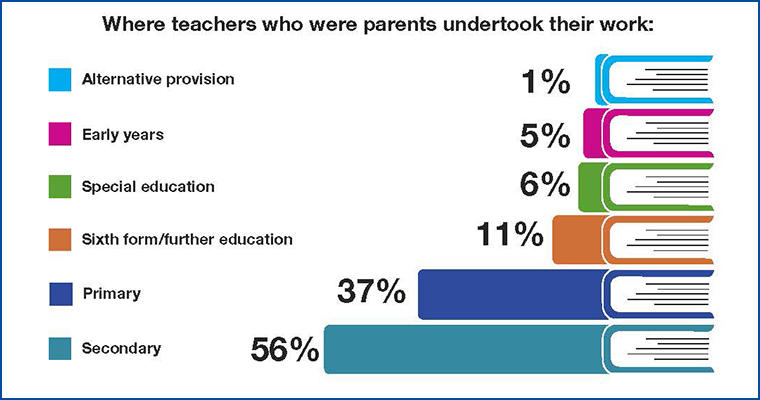
Of those teachers who responded, well over half (56%) reported that they worked in a secondary school, compared to just under two fifths (37%) who reported working in a primary school. Just over one in ten (11%) reported working in the sixth-form/further education sector and 6% reported working in special education. One in 20 (5%) reported working in early years and just 1% reported working in alternative provision (e.g. pupil referral units).
Being a teacher and a parent
Teachers who are parents were asked about their ability to balance responsibilities at work with being a parent.
Of those teachers who are parents, almost all (96%) stated that they had found it difficult to balance their responsibilities at work with being a parent and 87% felt that they had regularly missed out on important times with their children due to their work commitments.
Teachers who are parents were asked if their job ever got in the way of them doing certain things relating to their children. Of those who responded:
-
82% stated that their job got in the way of them looking after their children when they were ill;
-
79% stated that their job got in the way of them attending their child’s/children’s school assemblies;
-
77% stated that their job got in the way of them attending their child’s/children’s sports days;
-
70% stated that their job got in the way of them attending their child’s/children’s school play;
-
44% stated that their job got in the way of them attending the parents’ consultation meeting for their child/children; and
-
35% stated that their job had got in the way of them doing ‘other’ things relating to their children, e.g. spending quality time with them in the evening and at weekends, attending appointments, attending after-school clubs and activities.
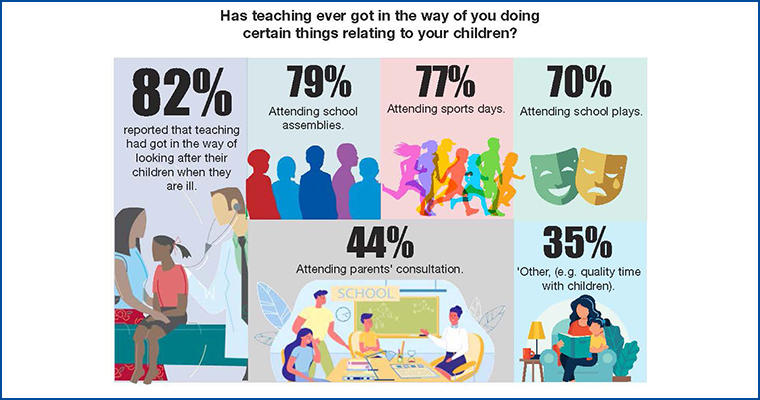
Teachers who are parents were asked if time spent working outside school hours ever got in the way of their ability to do a range of activities.
Well over nine in ten (96%) reported that time spent working outside school hours got in the way of spending quality time with their child/children at home and almost seven in ten (69%) reported that it got in the way of helping their child/children with their homework.
Sixty-six per cent reported that it got in the way of going on family outings/days out, just under a quarter (23%) reported that it got in the way of doing other activities with their child/children, e.g. after-school activities/clubs, bedtime, playing together, taking them to parties, and a fifth (20%) reported that it got in the way of going on family holidays.

I have never attended a single sports day, assembly, play or parents’ evening due to my own working schedule at school. My children have missed out through having an absent mother who is a teacher. They just say, ‘Mum can’t be here as she is a teacher’. It is heartbreaking that I have let my children down for my school.
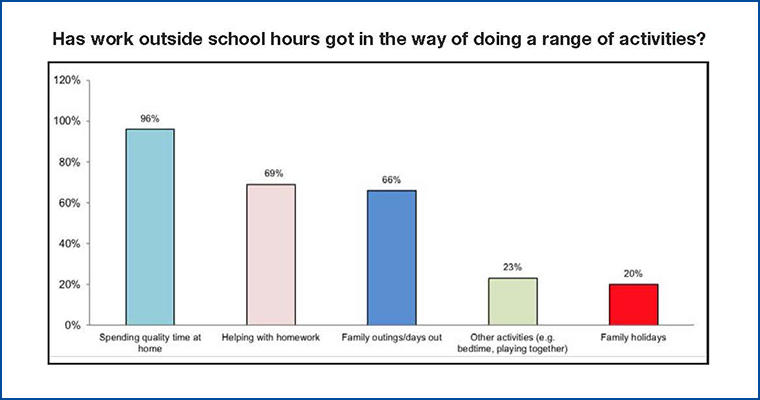
Flexible working
Teachers who are parents were asked about their experiences of flexible working in response to their parental responsibilities, including the attitudes of schools and colleges in respect of this.
Just over two fifths of teachers (42%) responded that they had asked their employers for flexible working due to their parental responsibilities.
Of those teachers who made a request for flexible working, well over three quarters (78%) requested a reduction in their hours, under one in ten (8%) requested a job share and just 3% requested compressed hours.
More than one in ten (11%) requested other types of flexible working, e.g. working from home, temporary variation, later start/earlier finish, and taking planning, preparation and assessment (PPA) time at home.
Three in ten teachers (30%) reported that their last request to their employer for flexible working was not granted.

Of those teachers whose request for flexible working was rejected:
-
49% stated that this was because their employer said it would be too difficult to accommodate;
-
43% stated it was because their employer said it would be too disruptive to pupils/staff;
-
18% stated it was because their employer said it would be too difficult to recruit extra staff; and
-
13% stated it was because their employer said it would be too expensive.
A quarter (25%) stated that there were ‘other’ reasons for their employer rejecting their request for flexible working, e.g. parental expectations, the position of the school/Ofsted, not school policy, and detrimental impact on provision/results.
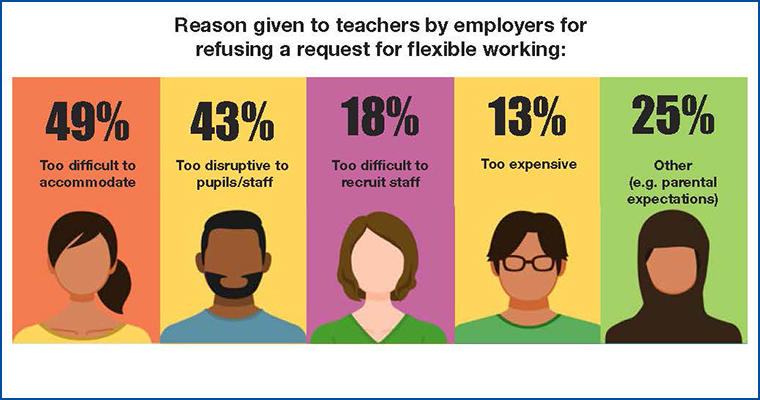
More than one in ten teachers (11%) reported that their employer had not provided a reason for refusing their request for flexible working.
Just over two thirds of teachers (67%) reported that they were not given the right to appeal the decision by their employer to reject their request for flexible working, despite this being good practice and recommended in the Acas guidance to flexible working.
My employer does not accept any flexible working requests because he thinks part-time teachers do not work.
The only way I was granted flexible working was to sacrifice my role as assistant headteacher and become a classroom teacher.

Taking time off work to care for a child or children
Teachers who are parents were asked about their experiences when caring for a child/children and the need to take time off work.
Just over four fifths of teachers (81%) reported that they had taken time off because their child/children were ill.
Disappointingly, just over one in ten teachers (12%) stated that their request for time off to care for a child/children had been refused.
It is allowed, usually, but very begrudgingly. I am always asked if there is someone else who can do it. I am separated from my husband and I was asked once if he could look after our daughter instead.
In regard to how accommodating the employer was to staff who needed time off when a child was ill, 15% of teachers stated that their employer was very accommodating and just under three in ten teachers (29%) stated that their employer was accommodating.
Just under a fifth of teachers (17%) stated that their employer was unaccommodating and almost one in ten teachers (8%) stated that their employer was very unaccommodating.
Family-related leave and pregnancy
Teachers were asked about their experiences of family-related leave and pregnancy, including maternity leave, paternity leave and shared parental leave.
Of those teachers who had taken family-related leave in the last five years, just over four fifths (82%) reported that they had taken maternity leave, 16% had taken paternity leave, and just 2% had taken adoption leave.
Fourteen per cent of teachers reported taking two weeks of maternity/paternity/ adoption leave and just over one in 20 teachers reported taking maternity/paternity/adoption leave of between one to five months.
Just under one in ten teachers (9%) took six months of maternity/paternity/adoption leave, whereas well over two fifths of teachers (46%) took between seven to 11 months of maternity/paternity/adoption leave. Just under a quarter of teachers took a year off for maternity/paternity/adoption leave.
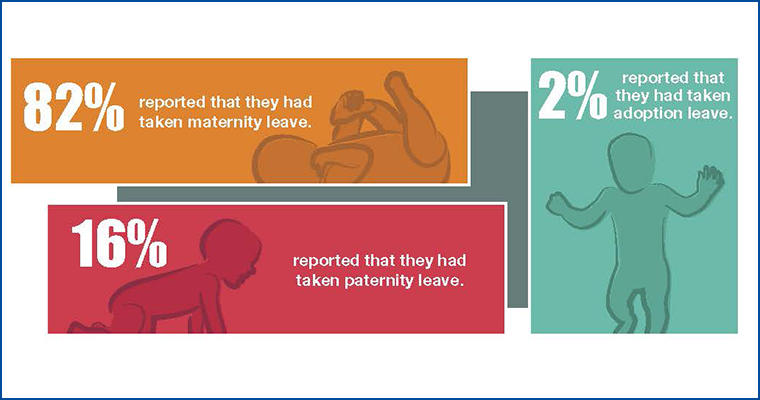
Just over three quarters of teachers (76%) stated that they would have liked to have taken more time off for maternity/paternity/adoption leave.

In regard to employers keeping teachers informed of important information while they were on maternity/paternity/adoption leave, under two thirds of teachers (64%) reported that their employer did not keep them informed, whereas well over a third of teachers (36%) reported that their employer did keep them informed.
When asked about the response of the employer to their pregnancy/ pregnancies, well over half of teachers (55%) reported that the employer had not adequately assessed and mitigated workplace risks.
More than nine in ten teachers (92%) stated that their employer allowed paid time off to attend antenatal/adoption appointments, whereas one in 20 (5%) stated that their employer allowed unpaid time off to attend antenatal/adoption appointments. Three per cent stated that their employer did not allow time off to attend antenatal/adoption appointments.
Just under seven in ten teachers (69%) reported that they had requested time off from their employer to attend antenatal appointments with their partner. Of those, just under four fifths (79%) responded that this was paid time off, whereas 18% responded that this was unpaid time off. Two per cent responded that their request for time off was refused.
Under two fifths of teachers (38%) reported that they had taken time off work due to a pregnancy-related illness and of those, just under two fifths (39%) reported that they felt pressured into returning to work before they were well enough to do so.
I was never informed of any developments at work. I came back to work to find two redundancies had taken place within my own department and my purpose-built drama room had become a maths classroom.
Paternity leave is shockingly poor. I was only able to take a maximum of two weeks and there was a significant financial hit.
When off work due to pregnancy-related illness, almost nine in ten teachers (88%) stated that they had been asked to set work for their classes and/or plan lessons and 29% of teachers stated that they had been asked to write reports.
Just under a quarter of teachers (23%) stated that they had been asked to mark work and 9% of teachers stated that they had been asked to attend meetings. A further 9% of teachers stated that they had been asked to do other things.
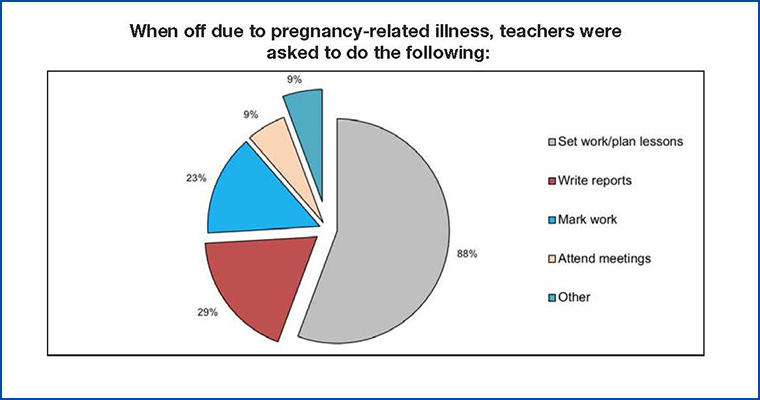
Despite the fact that employers are obliged to record pregnancy-related sickness absence separately and discount this for the purpose of sickness absence, just under a quarter of teachers (24%) reported that their employer counted the time off as sickness absence and just under half of teachers (48%) reported that they did not know.
I work all day Sunday. I miss sport and the chance to go on days out. I am leaving the profession asap. Holidays are cut to three or four days as I have to prepare new curriculum all the time. Also, I cannot help my own kids as much.
I was made redundant from my previous teaching job during my maternity leave. It completely ruined the early days with my son - when I should have been focused on him, I was worrying about money, employment and then looking and applying for jobs. The person who was covering my maternity is still doing the role now.

Conclusion
Whilst the Covid-19 pandemic has highlighted the importance of teachers, the 2020 Being a Teacher and a Parent survey revealed that the experiences of teachers who are parents show that there are still significant challenges in the working culture and practices operated by employers in order to making employment practices more flexible and family-friendly.
The 2020 survey reveals that many teachers who are parents are struggling to achieve a satisfactory work/life balance, with many working at home in the evening and at weekends, sacrificing time and key moments with their own children, in order to meet the demands placed upon them by employers.
In respect of flexible working, it is concerning that the 2020 survey suggests that, despite the obvious benefits, uptake of flexible working in education remains low, with many employers refusing requests for flexible working made by teachers.
The evidence suggests that too many employers are failing to agree to flexible working requests and thereby denying teachers the right to flexible working, specifically part-time working and job share, often without the right of appeal.
Given the tendency for requests for flexible working to disproportionately come from female teachers, this represents a key factor in the gender pay gap in teaching, as many women teachers are forced to resign from substantive contracts of employment because schools will not agree to flexible working arrangements following maternity leave or because other carer commitments have arisen.
Under these circumstances, women teachers frequently suffer career setbacks as they are driven into part-time, low-paid, employment agency work in order to secure flexible working.
Despite the fact that leave entitlements for parents are an integral part of the employment landscape (e.g. maternity leave, paternity leave and adoption leave), many parents who are teachers, specifically women during their pregnancy or maternity leave, are being treated negatively or in a discriminatory way, including being dismissed, demoted or harassed by colleagues or managers/senior leaders.
Furthermore, despite evidence demonstrating the significant positive benefits when partners spend periods caring for young children, feedback suggests that policies designed to help partners take a more active role in childcare, including paternity leave and shared parental leave, are failing to deliver.
Access to good parental leave is integral to flexible employment practices, as it provides parents with greater control whilst enabling employers to recruit workers from a wider talent pool, particularly women who are often forced into low-paid, part-time and insecure work.
In this context, the results from the 2020 survey indicate that there is a pressing need for action on the part of the Government and employers to address the concerns of hard-working and dedicated parents who are teachers, so that they are given the freedom and flexibility to better manage the demands of work with that of a family.
It is clear that the Government and employers need to act, especially if they are going to ensure that everyone can reach their true potential, specifically breaking down inequalities so women are free to choose and do whatever they want to, as well as achieving the policy objectives of parental leave and pay.

